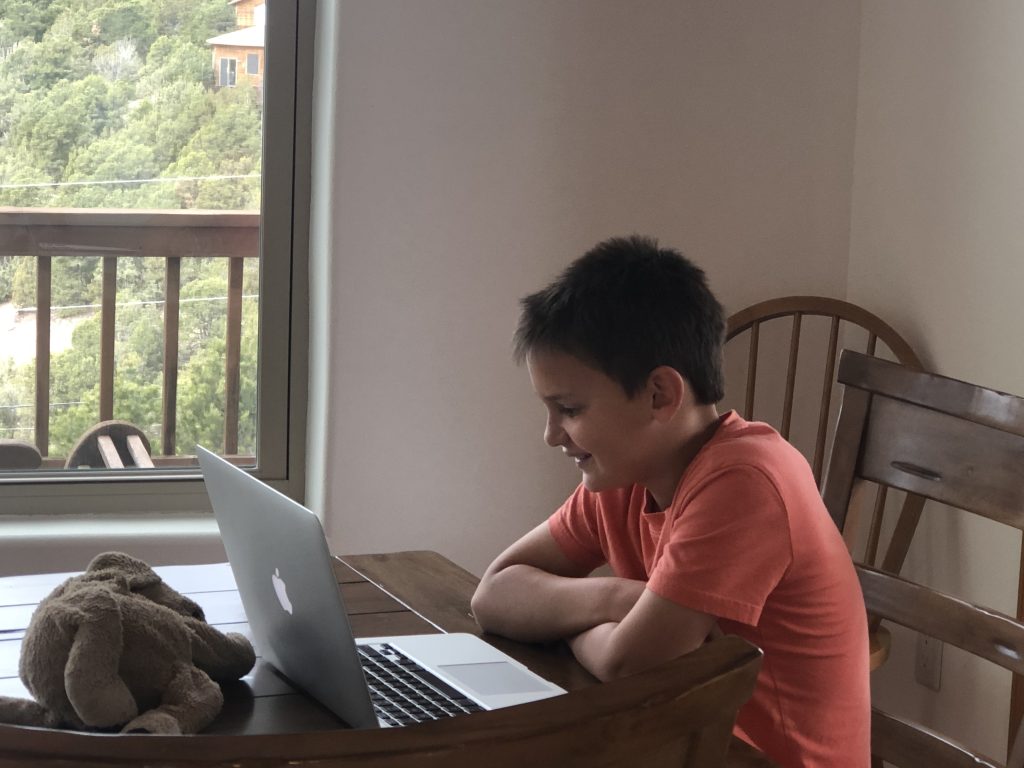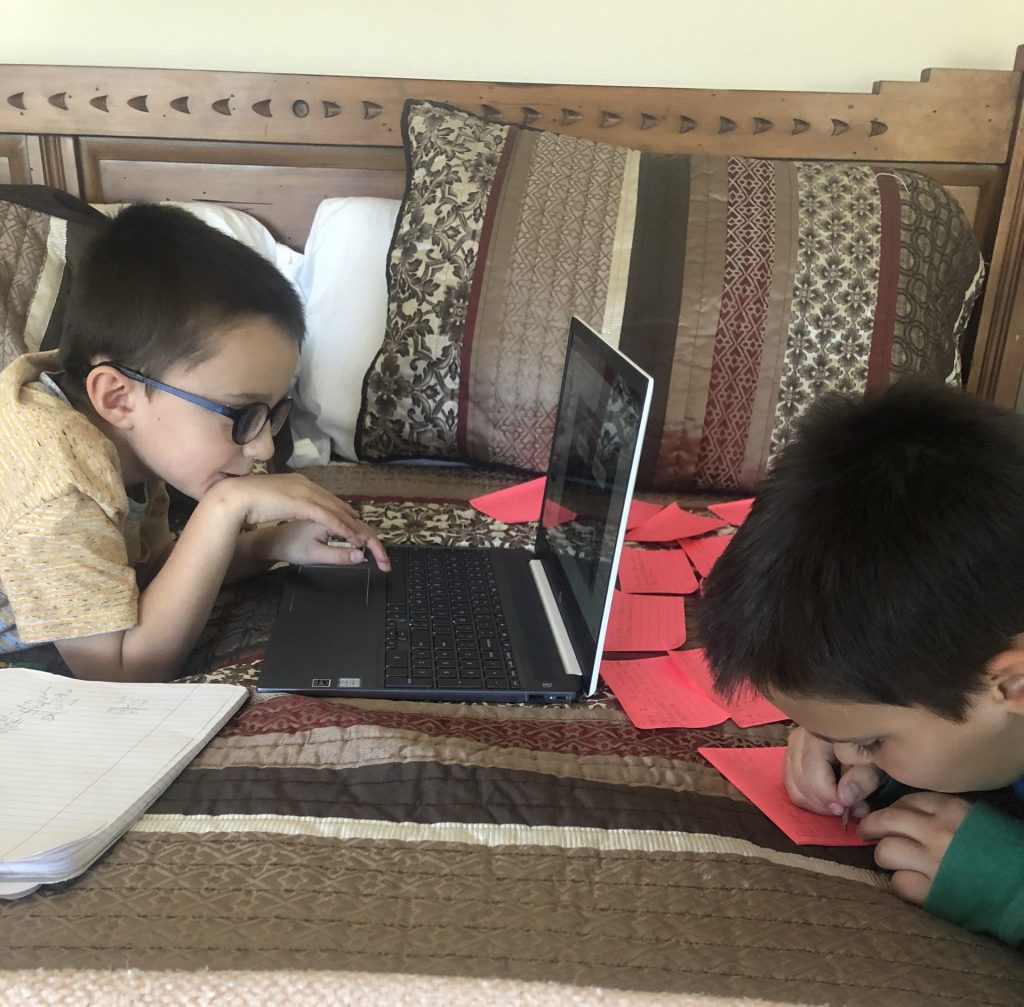“Mom, I seriously don’t know how to do any of the problems on this test.” The day Levi said this, I began asking, “Does my child have a learning disability?”
It was late in the fall of 2021, and we’d been doing online schooling for quite some time already. This situation was a struggle for everyone, but especially for our middle son, Levi. At times, I had thought that he was just not paying attention. However I started sitting down to watch him work through online math class. I saw that he was actually paying attention and working really hard to keep up. Yet, he still had no clue what was going on.
» » » » » » » » RELATED READ: Spelling Brought Tears: My Dyslexia Journey « « « « « « « « « «
Something was up. I began to work one-on-one with him through each day’s math lessons, and he started making progress. “Cool,” I thought, “he just needed some individual attention.” But there was more to the story.

Additionally, I started working with Levi through his reading comprehension worksheets. Interestingly (and frustratingly), Levi would verbally answer each question absolutely perfectly. However, when he attempted to write out his answers, the words simply wouldn’t come. Often, he would write sentences that made no sense at all or had nothing to do with what he had just said.
I knew I had to do something.
First, I voiced my concerns to Levi’s teacher, who respectfully disagreed with me. She did, however, begin following the Albuquerque Public Schools protocol for when a parent voices concern over a possible learning disability. The school’s designated IEP head met with the two of us. In that meeting, I learned some very important information.
- When a child is suspected of having any kind of learning disability, their teacher must take eight weeks to carefully document the child’s academic and behavioral performance.
- After the eight weeks of documentation are complete, the teacher must make a recommendation, according to APS’ stated guidelines, on whether the child should be tested.
- The packet containing the school’s documentation and teacher’s recommendation are submitted to APS, and everyone waits for their verdict on whether the child is in need of testing.
- If APS doesn’t deem the child’s performance poor enough, they will not be tested.
- When a parent obtains a medical diagnosis on their own, APS has no choice but to issue the child an IEP and put appropriate accommodations for them in place.
Yeah. So Levi could maybe, possibly, hopefully, get help the following school year if we began the process immediately and hoped that he performed poorly enough. I couldn’t help him with his studies anymore. He would just have to show how bad off he was in hopes that APS would help him out with some testing. And that testing would maybe occur at the very end of the school year, so he might be able to get an IEP set up late in the fall of the following year.
So I’m sure you can guess what we did. We sought out a diagnostician.
There may be medical doctors that can issue testing for learning disabilities. We just don’t happen to know them. When we found a diagnostician who could test for the gamut of learning disabilities, we were shocked at the cost. $1200. And no, our private medical insurance had no interest in paying any part of that.
» » » RECOMMENDED RESOURCE: Guide to Albuquerque Resources for Kids with Differences and Disabilities « « «
We put it all on a credit card and scheduled the appointment.
The testing was an all-day affair. Levi was quite tired by the end of it, but confident that he’d been thoroughly tested. When we heard back from the diagnostician a few days later, we were shocked at what he found.

Levi tested at an average or above average level in every area EXCEPT for one: fine motor skills.
In this area, he tested at the 2nd percentile. This means that he performed worse on this portion of the test than 98% of children his age. The diagnostician explained that for Levi, the mechanics required for writing essentially take up so much brain power for him that he’s left with almost nothing. He cannot think AND write, make computations AND write, or really do any other writing/brain work combination. This was so surprising to us because of all our kids, Levi had always been the most physically adept. But the results spoke for themselves.
The diagnostician also had a solution: occupational therapy. He recommended three organizations in Albuquerque. We checked them all out, jumped on waiting lists, and were thrilled to be able to start working with a therapist within about two months. Interestingly, our insurance was willing to help us with that part.
We finally had hope, armed with something we could do.
We were also given a list of recommended school accommodations. These were things like having Levi test verbally instead writing, typing papers instead of writing them out, being allowed to work in groups, and receiving individual and small group attention. Levi’s teacher was more than happy to employ his accommodations, and she actually thought of and utilized a few herself.
Since beginning therapy and working differently in school, Levi has grown by leaps and bounds. His confidence has soared. He has found his voice and is not worried anymore about asking for help. Levi looks forward to therapy every week and continues to work toward movement and coordination goals that free up brain power. Most of all, Levi has stopped thinking he is not smart or capable. He is working on focusing on his own progress, instead of comparing himself to others.
Through his diagnosis and therapy work, Levi has learned that he can overcome difficulties, take control of his path, and advocate for himself.
Oh, and by the way, even though we got our medical diagnosis, the school was required to see the testing request process through. Guess what? APS denied our request. Had we relied on them, Levi would never have received any help at all.
I wrote a letter to APS’ superintendent.
In a city where 78% of our public schools qualify for Title 1 status (meaning that 50% or more of the student population qualifies for food services according to family income), how are we putting families in this position?
How many Albuquerque families are fortunate enough to shell out $1200 for a test for their kids and still feed them that month? I believe that this issue is directly tied to our city’s climbing drop-out rate. How many APS kids are falling behind simply because they are not receiving the help they need? What a tragedy that so many of them decide early on that school just isn’t for them when all they need is a little understanding of how they operate.
How many teachers are feeling as though their methods are failing, without knowing how many of their students have issues going on that they can’t control? Something needs to change.
There IS help and hope!
My hope in sharing this is that you will feel empowered to advocate for your student in a system that may not be designed to help them. I also hope that you’ll hear that you’re not alone, and I hope your kids know that too. Our diagnostician told us that EVERYONE has a “learning disability” of some kind. Each of us simply has to find ways to learn that work for us. We find tips and tools and tricks to employ so that we can succeed. Sometimes, we just need a little help finding them.
If you suspect your child has a learning disability, don’t give up until you get them the help they need. Check out this article to learn more about signs, symptoms, and suggested next steps. Additionally, check out this wonderful newsletter a friend shared with me here. I believe you’ll find it very encouraging. Your doctor may be able to recommend diagnostic services that do not cost what we paid. Additionally, please let APS know what you think.
Levi has shown us that change is possible!
The opinions expressed in this post are those of the author. They do not necessarily reflect the official policy or position of ABQ Mom, its executive team, other contributors to the site, its sponsors or partners, or any organizations the aforementioned might be affiliated with.











